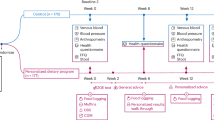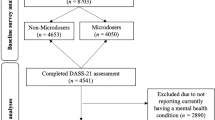Abstract
Background/objective:
Knowledge does not automatically translate into behaviour change. This study examined the relationship between knowledge of appropriate foods and beverages needed for weight loss and the diet of patients seeking weight management.
Subjects/methods:
A cross-sectional study of 104 consecutive first-time patients (55 women and 49 men) seeking weight management, with a mean age of 37.3±11.8 years and a BMI of 44.9±9.4 kg/m2, was carried out; 67.3% of these patients had a BMI of 40 kg/m2 or greater. Patients were told to design a detailed weight-loss diet that they would recommend to a person with the same characteristics (recommended diet or RD) as themselves and asked whether the RD was similar to their own. Consumed diet (CD) was assessed by a different dietitian through a 24-h diet recall. Estimated energy requirement (EER), energy content of RD and CD and number of fruit, vegetable, cereal and sweetened-beverage portions were calculated. Statistical differences were assessed through the Pearson's correlation and the Wilcoxon's rank-sum tests.
Results:
RD and CD were 1104±243 and 1976±708 kcal for women and 1254±287 and 2743±1244 kcal for men, with statistical differences for both genders (P<0.001). Energy content of the RD was lower than the EER in men and women (P<0.001); CD was lower than the EER in women (P=0.033). Number of fruit/vegetable portions was lower in CD than in the RD in women (P<0.001), whereas cereal and sweetened-beverage portions were higher in CD than in the RD in both genders (P<0.001). RD was not followed by 46.1% of the patients.
Conclusions:
Patients with obesity seeking care have knowledge of the appropriate dietary strategies needed for weight loss, but do not translate it into practice. Treatment approaches should include tools that help patients to implement their nutrition knowledge.
This is a preview of subscription content, access via your institution
Access options
Subscribe to this journal
Receive 12 print issues and online access
$259.00 per year
only $21.58 per issue
Buy this article
- Purchase on Springer Link
- Instant access to full article PDF
Prices may be subject to local taxes which are calculated during checkout

Similar content being viewed by others

References
Gutiérrez JP, Rivera-Dommarco J, Shamah-Levy T, Villalpando-Hernández S, Franco A, Cuevas-Nasu L et al. Encuesta Nacional de Saludy Nutrición 2012. Resultados Nacionales. Cuernavaca, México: Instituto Nacional de Salud Pública, 2012.
Crites SL . Impact of nutrition knowledge on food evaluations. Eur J Clin Nutr 2005; 59: 1191–1200.
O’Donoghue T, Rabin M . The economics of immediate gratification. J Behav Dec Making 2000; 13: 233–250.
Downs JS, Lowenstein G, Wisdom J . The psychology of food consumption. Strategies for promoting healthier food choices. Am Econ Rev Papers Proc 2009; 99: 1–10.
Prell HC, Berg MC, Jonsson LM, Lissner L . A school-based intervention to promote dietary change. J Adolesc Health 2005; 36: 529–534.
Turconi G, Guarcello M, Maccarini L, Cignoli F, Setti S, Bazzano R, et al. Eating habits and behaviors, physical activity, nutritional and food safety knowledge and beliefs in an adolescent Italian population. J Am Coll Nutr 2008; 27: 31–43.
Thomas J . New approaches to achieving dietary change. Curr Opin Lipidol 1994; 5: 36–41.
Wardle J, Parmenter K, Waller J . Nutrition knowledge and food intake. Appetite 2000; 34: 269–275.
Brug J, Oenema A, Ferreira I . Theory, evidence and intervention mapping to improve behavior nutrition and physical activity interventions. Int J Behav Nutr Phys Act 2006; 2: 2.
Dickson-Spillmann M, Siegrist M . Consumers' knowledge of healthy diets and its correlation with dietary behaviour. J Hum Nutr Diet 2011; 24: 54–60.
Worsley A . Nutrition knowledge and food consumption: can nutrition knowledge change food behaviour? Asia Pac J Clin Nutr 2002; 11 (Suppl): S579–S585.
Lohman T, Roche A, Martorell R (eds). Anthropometric Standardization Reference Manual 1988, Champaign, IL, USA: Human Kinetics Books, pp 3–70.
Velazquez CE, Pasch KE, Ranjit N, Mirchandani G, Hoelscher DM . Are adolescents' perceptions of dietary practices associated with their dietary behaviors? J Am Diet Assoc 2011; 111: 1735–1740.
Pérez-Lizaur AB, Palacios Gonzáles B, Castro-Becerra AL . Sistema mexicano de alimentos equivalentes 2008, (3rd edn). México: Cuadernos de Nutrición/Fomento de Nutrición y Salud.
Mifflin MD St, Jeor ST, Hill LA, Scott BJ, Daugherty SA, Koh YO . A new predictive equation for resting energy expenditure in healthy individuals. Am J Clin Nutr 1990; 51: 241–247.
Dobratz JR, Sibley SD, Beckman TR, Valentine BJ, Kellogg TA, Ikramuddin S et al. Predicting energy expenditure in extremely obese women. J Parenter Enteral Nutr 2007; 31: 217–227.
Frankenfield D, Roth-Yousey L, Compher C . Comparison of predictive equations for resting metabolic rate in healthy nonobese and obese adults: a systematic review. J Am Diet Assoc 2005; 105: 775–789.
WHO. Fruit and Vegetable Promotion Initiative—Report of the Meeting, Geneva, 25–27 August 2003. World Health Organization, 2003. Available at: http://www.who.int/dietphysicalactivity/publications/f&v_promotion_initiative_report.pdf (last accessed 20 May 2014).
Joint FAO/WHO Workshop on Fruit and Vegetables for Health. Report of a Joint FAO/WHO Workshop, 1–3 September, 2004, Kobe, Japan (last accessed 20 May 2014).
Heitmann BL, Lissner L . Dietary underreporting by obese individuals—is it specific or non-specific? BMJ 1995; 311: 986–989.
Johansson G, Wikman A, Ahrén AM, Hallmans G, Johansson I . Underreporting of energy intake in repeated 24-hour recalls related to gender, age, weight status, day of interview, educational level, reported food intake, smoking habits and area of living. Public Health Nutr 2001; 4: 919–927.
Ballard-Barbash R, Graubard I, Krebs-Smith SM, Schatzkin A, Thompson FE . Contribution of dieting to the inverse association between energy intake and body mass index. Eur J Clin Nutr 1996; 50: 98–106.
O'Brien G, Davies M . Nutrition knowledge and body mass index. Health Educ Res 2007; 22: 571–575.
Ullah S, Arsalani-Zadeh R, Macfie J . Accuracy of prediction equations for calculating resting energy expenditure in morbidly obese patients. Ann R Coll Surg Engl 2012; 94: 129–132.
Miller WM, Spring TJ, Zalesin KC, Kaeding KR, Nori Janosz KE, McCullough PA et al. Lower than predicted resting metabolic rate is associated with severely impaired cardiorespiratory fitness in obese individuals. Obesity (Silver Spring, MD) 2012; 20: 505–511.
Panossian LA, Veasey SC . Daytime sleepiness in obesity: mechanisms beyond obstructive sleep apnea—a review. Sleep 2012; 35: 605–615.
Soriano R, Ponce de León Rosales S, García R, García-García E, Méndez JP . High knowledge about obesity and its health risks, with the exception of cancer, among Mexican individuals. J Cancer Educ 2011; 27: 306–311.
Finkelstein EA, Brown DS, Evans WD . Do obese persons comprehend their personal health risks? Am J Health Behav 2008; 32: 508–516.
Obesity as a Public Health Issue: A look at solutions. Available at: www.phsi.harvard.edu/health_reform/poll_results.pdf. (published 11 June 2003; accessed 10 May 2012).
Ogden CL, Carroll MD, Curtin LR, McDowell MA, Tabak CJ, Flegal KM . Prevalence of overweight and obesity in the United States, 1999–2004. JAMA 2006; 95: 1549–1555.
Story M, Neumark-Sztainer D, French S . Individual and environmental influences on adolescent eating behaviors. J Am Diet Assoc 2002; 102 (Suppl): S40–S51.
Newby PK, Weismayer C, Akesson A, Tucker KL, Wolk A . Longitudinal changes in food patterns predict changes in weight and body mass index and the effects are greatest in obese women. J Nutr 2006; 136: 2580–2587.
Beaton GH, Milner J, McGuire V, Feather TE, Little JA . Source of variance in 24-hour dietary recall data: implications for nutrition study design and interpretation. Carbohydrate sources, vitamins, and minerals. Am J Clin Nutr 1983; 37: 986–995.
OECD (2010). PISA 2009 Results: Executive Summary. Available at: http://www.oecd.org/pisa/pisaproducts/46619703.pdf (accessed 23 February 2014).
Bandura A . The primacy of self-regulation in health promotion. Appl Psychol 2005; 54: 245–254.
Miller LM, Cassady DL . Making healthy food choices using nutrition facts panels. The roles of knowledge, motivation, dietary modifications goals, and age. Appetite 2012; 59: 129–139.
Author information
Authors and Affiliations
Corresponding author
Ethics declarations
Competing interests
The authors declare no conflict of interest.
Rights and permissions
About this article
Cite this article
Kaufer-Horwitz, M., Villa, M., Pedraza, J. et al. Knowledge of appropriate foods and beverages needed for weight loss and diet of patients in an Obesity Clinic. Eur J Clin Nutr 69, 68–72 (2015). https://doi.org/10.1038/ejcn.2014.102
Received:
Revised:
Accepted:
Published:
Issue Date:
DOI: https://doi.org/10.1038/ejcn.2014.102
This article is cited by
-
Appetite for change: a multidisciplinary team approach to behavioral modification for weight management in a community health group setting
Eating and Weight Disorders - Studies on Anorexia, Bulimia and Obesity (2016)


